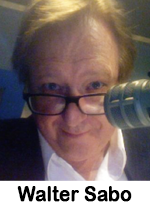By Walter Sabo
Consultant, Sabo Media
A.K.A. Walter Sterling
Radio Host, Sterling On Sunday
Talk Media Network
 HALF of all radio stations in the United States lose money – at least they did back in 1991. The NAB used to put out an annual report revealing how many radio stations were profitable. Usually half the stations in America lost money. Since consolidation, the NAB stopped putting out that report. It is reasonable to believe that far, far fewer stations lose money today. Shared costs, real estate, technical economies due to digital equipment versus analog all indicate that there must be fewer money-losing properties.
HALF of all radio stations in the United States lose money – at least they did back in 1991. The NAB used to put out an annual report revealing how many radio stations were profitable. Usually half the stations in America lost money. Since consolidation, the NAB stopped putting out that report. It is reasonable to believe that far, far fewer stations lose money today. Shared costs, real estate, technical economies due to digital equipment versus analog all indicate that there must be fewer money-losing properties.
The business of radio is very strong and appealing to investors. Apollo Advisers was the first money-in Sirius. The Apollo fund recently bought Cox radio. Marc Rowan, Apollo’s CEO is the smartest guy in any room. Rowan doesn’t invest in hunches; he buys businesses that grow return on investment.
In 1970, 7% of all ad dollars went to radio. Today, 7% of all ad dollars go to radio. In 1970, Procter & Gamble spent almost zero dollars in radio. Thanks to consolidation and the vision of Randy Michaels, radio has shifted from a “frequency” ad buy to a “reach” buy. Reach commands higher rates and more sophisticated advertisers. The RAB’s Erica Farber and Sound Mind’s Kraig Kitchin focused on winning P&G dollars. Today, Procter & Gamble is a top-five radio advertiser.
Are you sick and tired of “experts” saying that radio is slow to digital? Radio is not slow, radio was first-in. Mark Cuban put thousands of stations on Broadcast.com in the 1990s. Today radio leads the list of most downloaded podcasts. NPR has been the leader in podcasting since Alex Bennett started the industry. Under Bob Pittman and Jarl Mohn, iHeart and NPR dominate downloads.
Why the pessimism and anxiety in the hallways? It started with the management of consolidation. There are major consulting firms to help employees go through mergers. Consolidating an industry and its workforce is both an art and science. No radio company sought or engaged experienced expertise to manage consolidation. Instead, when a quarter’s revenue was missed, people were fired. Your friends in the next office were suddenly out of work. Layoffs should have happened all at once, based on a strategic plan. There is no plan. Firings are executed on random dates, with no notice; a horrible practice that continues. That’s why you’re miserable. No plan.
Radio stations in Canada, Europe, Australia and the UK are having excellent years. Canadian Music Week conventions, Commercial Broadcasters of Australia and European conferences are bursting with optimism and good news about radio. Why? Consider this possibility: Most radio companies outside the US are owned and managed by executives with a programming background. To do their jobs, programmers must be optimistic about the future. A salesperson’s job requires them to spend their days listening to media buyers’ objections to advertising on radio – negotiators! It sucks.
Consumers like or love radio. The reason SiriusXM Satellite Radio has 34 million listeners PAYING for radio is that listeners want MORE stations. Much, perhaps most, “music discovery” comes from radio listening. 53% of Americans will listen to radio today. In 1970, 53% of Americans listened to radio daily.
Walter Sabo was the youngest executive vice president in the history of NBC. The youngest VP in the history of ABC. He was a consultant to RKO General longer than Bill Drake. Walter was the in-house consultant to Sirius for eight years. He has never written a resume. Contact him at walter@sabomedia.com. or mobile 646-678-1110. Hear Walter Sterling at www.waltersterlingshow.com.
Share this with your network




 HALF of all radio stations in the United States lose money – at least they did back in 1991. The NAB used to put out an annual report revealing how many radio stations were profitable. Usually half the stations in America lost money. Since consolidation, the NAB stopped putting out that report. It is reasonable to believe that far, far fewer stations lose money today. Shared costs, real estate, technical economies due to digital equipment versus analog all indicate that there must be fewer money-losing properties.
HALF of all radio stations in the United States lose money – at least they did back in 1991. The NAB used to put out an annual report revealing how many radio stations were profitable. Usually half the stations in America lost money. Since consolidation, the NAB stopped putting out that report. It is reasonable to believe that far, far fewer stations lose money today. Shared costs, real estate, technical economies due to digital equipment versus analog all indicate that there must be fewer money-losing properties.